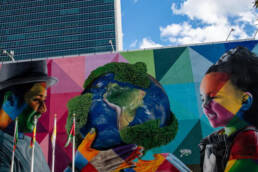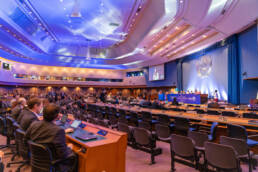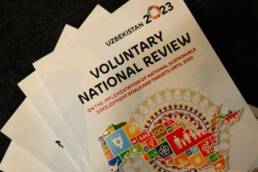Chapeau
The world stands at a crucial moment, as we face multiple and intersecting crises, we call for leaders to be bold and ambitious in their commitment to bring about a future where we live in a thriving and healthy planet, with inclusive societies living in peace, justice and according to the rule of law.
The document should be anchored in human rights and gender equality which are central to accelerating and achieving the 2030 Agenda. We call for specific reference to decent work and universal social protection by 2030; and acceleration of the critical pledge to leave no group or anyone behind. In our view, fundamental rights of all peoples, including the right to a healthy environment must be front and centre in the vision of our common future.
Chapter I. Sustainable development and financing for development
The 2030 Agenda provides humanity with a clear vision and path to a future which balances social, environmental, and economic priorities.
Firstly, we must tackle climate change as this poses the greatest threat to the future of humanity. Every effort must be made to reach the 2030 targets to decarbonize our lives and shift to a world powered by clean renewable energy. There should be a specific recognition of the need to accelerate action and deliver on the commitment to phase out fossil fuels. At the same time a shift to decentralized community-owned energy would enable new jobs and opportunities for millions of people around the world.
Secondly, the right to a healthy environment must be implemented and humanity must learn to find a balance with the living world around us. Biodiversity and the protection of species enriches our world and enables healthier lives for people. We cannot continue with indiscriminate mining and degradation of environments but must bequeath a living planet to future generations.
A third major aspect of sustainable development is the importance of social justice. The COVID-19 pandemic laid bare the deep-seated inequalities between and across all of our societies. There is a greater need than ever to ensure that economic resources are distributed in a fairer way to ensure that all people in society may lead healthy and fulfilling lives.
The fourth major aspect we would like to highlight is the economic dimension of sustainable development and resources.
Financing priorities for development must include reform of the International Financial Architecture, we call for:
- an increase in development cooperation and delivery of the commitment to 0.7% ODA;
- a multilateral debt relief architecture;
- support for intergovernmental processes towards development of a tax framework (UN Tax Convention);
- increased ambition for the reallocation of Special Drawing Rights based on need and in support of an SDG-led recovery;
- alignment of all investments with SDGs including social protection targets
- IFI and MDB reform, including more inclusive governance of these bodies.
Finally, the SDGs’ follow-up and review process should be strengthened. The HLPF should fulfill its key responsibility in providing policy guidance to the 2030 Agenda, producing a more action- oriented output. Voluntary National Reviews would be open, and participative, and present evidence-based information that would lead to sound knowledge sharing aimed at accelerating the SDGs. In this regard, scientific evidence should support the identification of key areas for sustainable investments to maximize development and sustainability co-benefits, as well as of longer-term investments that are needed for resilience building and transformation.
Chapter II. International peace and security
The world is facing major conflicts, we believe that peace is essential and the time for urgent action to seek and put in place solutions that protect humanitarian responses and civil society and fundamental freedoms is now.
We call for the end to populism and xenophobia and for peace, democracy and protection of human rights – including labor and social protection rights across the lifecourse. Peace is built on social justice and the social contract it requires equality, inclusion, participation, social protection, just wages and safe and secure work with the guarantee of fundamental rights and the rule of law.
- Participation of children, youth, women, older persons and persons with disabilities and other key affected communities in peace processes
- Adherence to International Humanitarian Law and the UN Charter
- End to ‘scapegoating’ and human rights abuses of migrants and asylum seekers, need to guarantee their social economic and civil rights according to obligations under international law.
Chapter III. Science, technology and innovation and digital cooperation
Chapter 3 of the Pact for the Future must reflect the central importance of science as a critical, cross-cutting tool to support evidence-based decision-making, foster shared understanding of the root causes of global challenges, playing a key role in addressing major issues, and informing anticipatory action, including to enhance prevention, preparedness, resilience, and transformation in the context of rapid change and polycrises.
Member States should commit to engaging interdisciplinary science in national development plans and across the multilateral agenda. UN deliberations and decision-making processes should draw on integrated scientific contributions from natural sciences, social sciences, practitioner and other forms of knowledge, which are key to breaking deep-seated siloes in how multilateral issues are framed, understood, and acted upon, thereby enabling more effective responses.
Member States should recognize the pivotal role of science education and open science. Ensuring access to quality education, especially in STEM, and implementing open science principles, including open access to research findings and data, can foster global collaboration, accelerate progress towards SDGs, and support human capacity building and innovation across nations.
Member States need to recognize the potential of digital cooperation and transformation in tackling major global challenges, and need to act with urgency to harness digital technologies to align with the 2030 Agenda, including preventing climate disaster, fighting poverty, and reducing inequalities, through cooperation and transformation.
- We call on governments and business to maximize, in every country, the potential of new technology to create decent, sustainable jobs that contribute to a zero carbon and eliminate poverty.
- We endorse the need for policies and regulations to govern digital technology, data and deployment of algorithms that respect and ensure human rights, privacy and people’s control over and ownership of their own data.
- We call for tax reform to ensure tech companies pay their fair share of tax in the country where profits are generated.
- We recommend Universal access to quality and affordable internet and proactive digitalization policies.
Chapter IV. Youth and future generations
Meaningful youth participation is crucial in decision-making processes on development policies at national, regional and global levels. The participation of young people provides space for
- We support the creation of institutional channels to guarantee youth participation and call for a representative of future generations to participate in all UN process.
- We call for decent and climate-friendly jobs for young people, including skills development and lifelong learning, as well as investments in gender-responsive strategies for skills development.
The world is ageing in all regions and countries. Young people today must look forward to a secure, dignified and healthy older age. Older people today should also have their rights and contributions recognised and upheld, including their engagement with and support for, younger generations.
Chapter V. Transforming global governance
In terms of global governance, we highlight the importance of all stakeholders in all their diversity and across the life course to be actively included in deliberations. The inputs from all stakeholder groups enable diverse voices to be heard and insights to be gathered from lived experience as well as independent research. This input is freely given and provides a broader range of views to enable an inclusive collective approach to decision-making.
We Call for a new model of global governance based on transparent, inclusive,gender- transformative and age inclusive multilateral frameworks under UN leadership, based on science, technology, innovation and data, and action-oriented which ensure the effective participation of social partners at all levels of decision making processes;
This should include:
- Specific engagement of all stakeholders in all UN processes
- Sharing of good practice models between UN agencies and clear secretariatsupport to participation of civil society
- Regular opportunities for dialogue both online and in person alongside all majorUN Summits, Committees and Conferences.
- Policies that conform to and enhance human rights obligations with gender,disability and age inclusive data measurement which is fully disaggregated globally,regionally and nationally.
- Defining focal points for Civil Society engagement in each UN entity.




